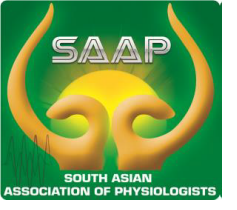|
 Following initial discussion through different means concept for establishing South Asian Association of Physiologists was approved at the Annual Meeting of Physiological Society of India at Faridabad on December 06, 2007. Accordingly, the Inaugural convention was held in conjunction with 11th Biennial of Pakistan Physiological Society at Shifa College of Medicine, Islamabad in 2008 when it first held with contributions of over 90 papers. Since then, SAAP’s has been held biennially. Conferences, so far been held Bangalore (2010), Colombo (2012), Dhaka (2014), Kathmandu (2016) and Lahore (2018) along with pre-conference workshops on Teaching Physiology. Besides, five physiological societies as full member, physiology fraternity from Bhutan was given the status of Associate member in 2019. The activities of SAAP were quickly owned by nearly 1000 medical colleges and universities all across South East Asia. It aims to promote research and teaching physiology by providing free communications to members and by actively committing itself to the national and international scientific communities. Following initial discussion through different means concept for establishing South Asian Association of Physiologists was approved at the Annual Meeting of Physiological Society of India at Faridabad on December 06, 2007. Accordingly, the Inaugural convention was held in conjunction with 11th Biennial of Pakistan Physiological Society at Shifa College of Medicine, Islamabad in 2008 when it first held with contributions of over 90 papers. Since then, SAAP’s has been held biennially. Conferences, so far been held Bangalore (2010), Colombo (2012), Dhaka (2014), Kathmandu (2016) and Lahore (2018) along with pre-conference workshops on Teaching Physiology. Besides, five physiological societies as full member, physiology fraternity from Bhutan was given the status of Associate member in 2019. The activities of SAAP were quickly owned by nearly 1000 medical colleges and universities all across South East Asia. It aims to promote research and teaching physiology by providing free communications to members and by actively committing itself to the national and international scientific communities.
Besides biennial conferences endorsing of various academic activities organized by member societies has been its primary engagement. Since 2020 however another publishing quarterly SAAP Bulletin is launched as another featured activity and now realizing importance of more readily and interactive engagement SAAP Website is launched. This will serve as a platform for sharing happenings in physiology in South Asia and beyond leading to access knowledge and perspective collaborations.
SAAP Aims and Objectives
- To promote peace, harmony, amity and progress in the South Asia Region using the SAAP platform.
- To build foundation of scientific bond amongst the physiologists, scientists, researcher and students in Physiology and allied sciences, of the SAARC Member Countries consonant with the SAARC Charter.
- To promote understanding and co-operation among physiologists, physiological associations/physiological societies, colleges, medical colleges and universities, teaching Physiology and allied sciences in the SAARC countries.
- To develop and promote co-operation in all matters related to Physiology education and research for the advancement of Physiological sciences among the SAARC member countries.
- To foster exchange of information and ideas in the field of Physiology and allied sciences between the SAARC member countries and to facilitate activities consonant with SAARC Charter as a SAARC recognized Body.
- To exchange technical information, experiences and expertise for welfare of the SAARC Member Countries by organizing seminars, workshops, symposia, technical fairs.
- To facilitate communication between the Member Societies and to organize and hold Regional Conferences every two years (biennial) or at such other times as determined by the General Council and to promote and support such other activities as may be deemed necessary for the realization of the above aims.
- To facilitate travel and hospitality for conference participants wherever convenient.
- To cooperate with the IUPS, FAOPS and other international bodies in scientific and educational programs.
|
|
(1st Biennial Conference) |
 Following initial discussion through different means concept for establishing South Asian Association of Physiologists was approved at the Annual Meeting of Physiological Society of India at Faridabad on December 06, 2007. Accordingly, the Inaugural convention was held in conjunction with 11th Biennial of Pakistan Physiological Society at Shifa College of Medicine, Islamabad in 2008 when it first held with contributions of over 90 papers. Since then, SAAP’s has been held biennially. Conferences, so far been held Bangalore (2010), Colombo (2012), Dhaka (2014), Kathmandu (2016) and Lahore (2018) along with pre-conference workshops on Teaching Physiology. Besides, five physiological societies as full member, physiology fraternity from Bhutan was given the status of Associate member in 2019. The activities of SAAP were quickly owned by nearly 1000 medical colleges and universities all across South East Asia. It aims to promote research and teaching physiology by providing free communications to members and by actively committing itself to the national and international scientific communities.
Following initial discussion through different means concept for establishing South Asian Association of Physiologists was approved at the Annual Meeting of Physiological Society of India at Faridabad on December 06, 2007. Accordingly, the Inaugural convention was held in conjunction with 11th Biennial of Pakistan Physiological Society at Shifa College of Medicine, Islamabad in 2008 when it first held with contributions of over 90 papers. Since then, SAAP’s has been held biennially. Conferences, so far been held Bangalore (2010), Colombo (2012), Dhaka (2014), Kathmandu (2016) and Lahore (2018) along with pre-conference workshops on Teaching Physiology. Besides, five physiological societies as full member, physiology fraternity from Bhutan was given the status of Associate member in 2019. The activities of SAAP were quickly owned by nearly 1000 medical colleges and universities all across South East Asia. It aims to promote research and teaching physiology by providing free communications to members and by actively committing itself to the national and international scientific communities.